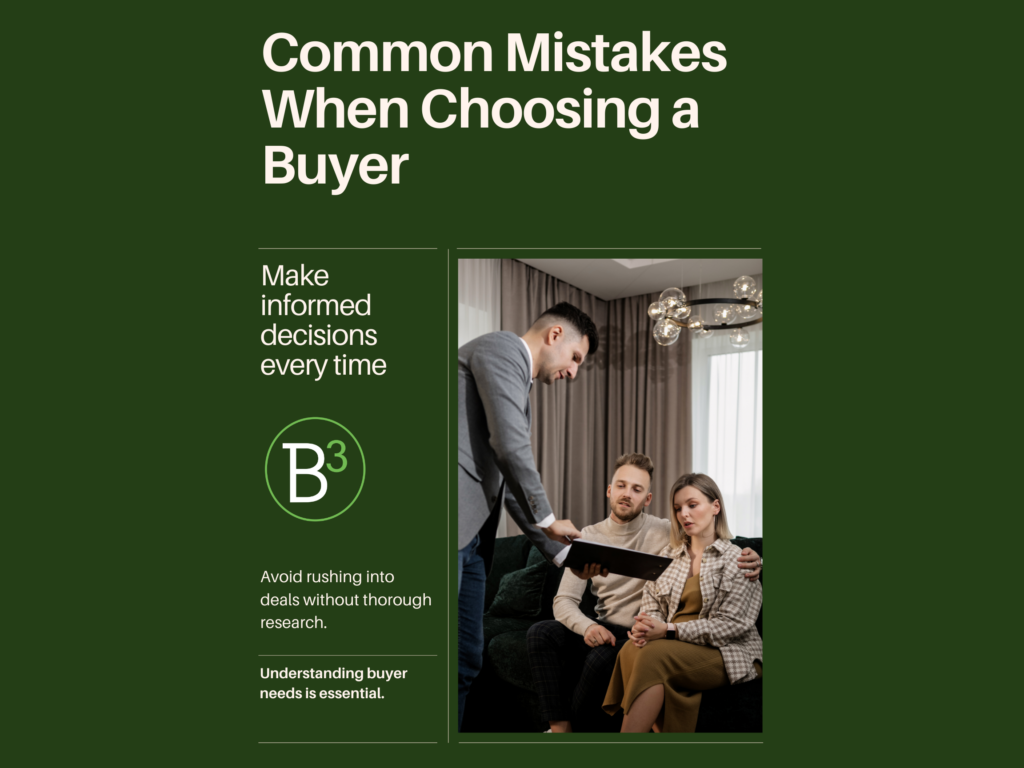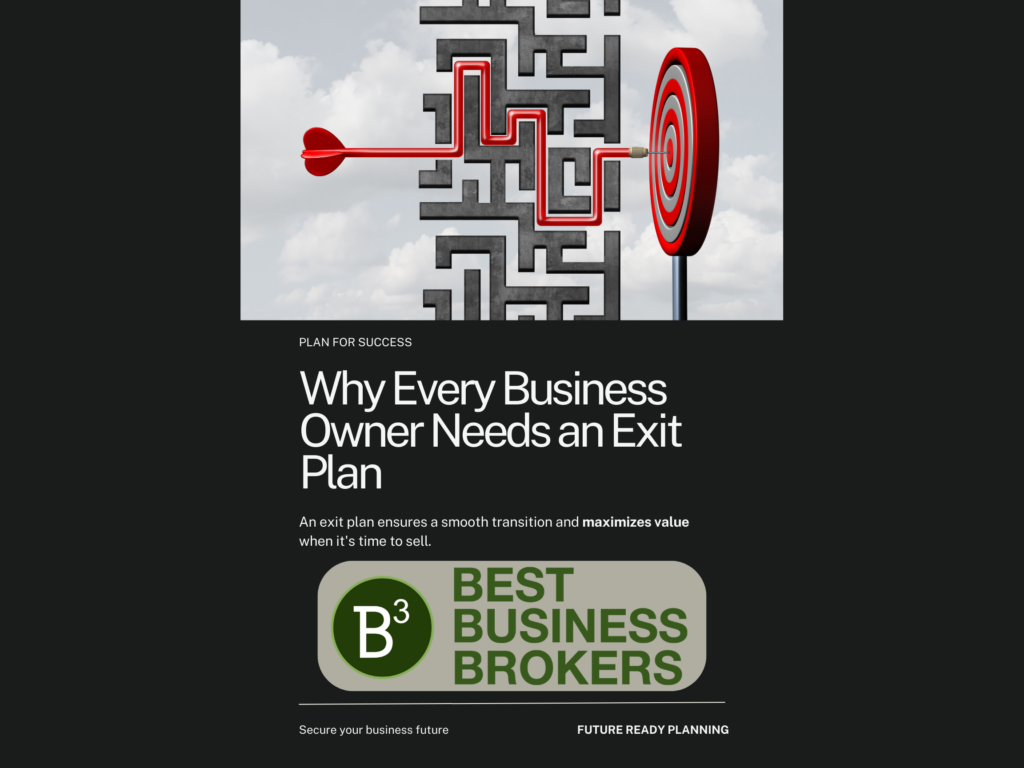A Guide to Success
Selling your business is more than just a transaction—it’s the culmination of years of dedication and the foundation of your future. Choosing the right buyer isn’t just about the highest bid; it’s about ensuring your vision, hard work, and team legacy are preserved. This decision shapes the success of your exit plan and underscores what matters most: alignment of values, goals, and capabilities. After all, a smooth transition doesn’t just protect profits; it protects the heart of what you’ve built.
It’s a complex journey, for sure, but one worth navigating with care. Understanding your buyer—whether they’re a strategic fit, a financial partner, or someone with a personal connection—can make all the difference. Paving the way to a seamless exit starts with thoughtful preparation and identifying a buyer who shares your long-term vision. To gain a deeper understanding and map out your strategy, explore resources like Small Business Exit Strategies that help set clear priorities and minimize uncertainty in your planning process.
Understanding the Core of an Exit Plan
Every business owner, at some point, will face the inevitable question: What’s next? An exit plan is about more than just walking away—it’s your blueprint to protecting everything you’ve worked so hard to build. Whether you’re planning years in advance or contemplating a more immediate departure, laying the groundwork is essential to ensuring both financial security and peace of mind.
What is an Exit Plan?
At its heart, an exit plan is a structured roadmap designed to help business owners transition out of their business while meeting personal and financial goals. Think of it as the ultimate personal guide, enabling you to navigate the complexities of business succession without losing focus on what matters most. It involves everything from evaluating the value of your business to determining the right strategy for transferring ownership. Resources like Exit Strategies for Small Businesses provide valuable insights to guide this process, ensuring you’re prepared for every step.
For a clearer understanding, an exit plan often includes answers to these pivotal questions:
- How will you transition ownership or leadership?
- What financial goals need to be met to secure your future?
- Who are the right buyers, and do they align with your vision?
Still uncertain of the specifics? External resources such as What Is an Exit Plan? explain the multifaceted approach necessary when planning your exit while maximizing the value of your business.
Why Every Business Owner Needs an Exit Plan
Why should you care about having a robust exit plan? It’s not just a “nice-to-have” document; it’s a necessity. Without one, you risk stumbling into an unprepared transition, which could jeopardize both your business and your long-term financial goals.
- Financial Security: Ensure a stable future for yourself and your loved ones by locking in a strategy that maximizes returns.
- Smooth Transitions: Make it easier for your business to continue thriving under new ownership, preserving the brand and culture you created.
- Legacy Preservation: An exit plan ensures that what you’ve built isn’t dismantled or devalued post-sale.
Check out this guide on Small Business Strategic Planning for insights that emphasize the importance of aligning the transition with your legacy goals. On a broader level, platforms like Why Every Business Owner Needs an Exit Plan underline how planning secures both personal and professional aspirations.
The Timing Factor in an Exit Plan
Timing isn’t everything, but it’s close. Knowing when to sell can often mean the difference between maximizing your business’s worth and settling for less. The market fluctuates, and various factors such as industry trends or buyer demand can significantly influence valuation. That’s why timing your exit is a key strategic decision.
The general rule? Start planning early. Experts like those at Time to Sell Your Small Business suggest that being proactive, not reactive, is key to capitalizing on opportunities. Whether it’s identifying strong market conditions or preparing your business for sale, having foresight in your planning allows you to control the narrative—and the valuation.
From ensuring alignment with industry cycles to preparing your business for peak readiness, timing is about strategy. External insights, like those from Exit Strategy Timing: A Time-Tested Approach, stress that understanding market conditions is just as critical as preparing your business well in advance.
Each of these elements—understanding what an exit plan entails, knowing why you need one, and mastering its timing—are threads in the fabric of a well-rounded strategy. With proper planning, you’ll not only secure your financial future but also ensure your business’s story continues seamlessly with its next chapter.
Characteristics of the Best Buyers in a Sale

Choosing the right buyer for your business is not just about ink on a contract—it’s about finding someone who will preserve the legacy you’ve built. A great buyer doesn’t just have the means to pay but also the vision and commitment to carry your business forward without tarnishing its values or culture. Let’s break this down into three key characteristics of the best buyers.
Financial Capability
A buyer’s financial situation is the cornerstone of a successful sale. Without the resources to purchase the business outright or sustain its operations, even the most promising deal could fall apart. Here’s what you need to consider:
- Proof of Funds: Buyers who are financially prepared will readily offer proof of their assets or financing agreements. This step ensures there’s no wild goose chase down the line.
- Stability: It’s critical to assess whether the buyer has a steady financial track record. Are they known for making sound investments?
- Growth Investment: Beyond just meeting payment obligations, ideal buyers should also have financial plans in place to invest in the business’s expansion.
When reviewing potential buyers, tools like Big Wins in Buying a Company may offer insights into how buyers think and operate based on their financial standing.
Cultural and Operational Fit
What happens to your team, customers, and the company culture after the sale? The degree to which a buyer aligns with your company’s ethos and operational style can be the deciding factor between a prosperous future or one full of friction.
- Shared Vision: Does the buyer appreciate your mission? Have they expressed commitment to maintaining the core principles that earned your business its reputation?
- Leadership Style: New ownership should ideally complement or enhance the existing management structure. Abrupt shifts in leadership tone can destabilize the team.
- Employee Consideration: A culturally-fit buyer won’t treat your employees as disposable assets. Instead, they’ll recognize them as the backbone of what makes the business successful.
To navigate cultural alignment challenges, you might explore experiences like those shared by Michael Gay, a Trusted Business Broker, who highlights why tailored strategies matter for long-term success.
Commitment to Growth
The best buyers don’t just maintain—they push for more. A strong commitment to growth ensures that your business won’t stay static under new ownership. Instead, it will evolve while staying true to its foundations.
- Clear Plan for Expansion: A solid buyer comes prepared with an actionable vision for how they’ll grow the business. Do they see new market opportunities? Are they open to innovation?
- Sustainability Goals: Growth without sustainability can lead to burnout—for employees and business infrastructure alike. Great buyers take a balanced approach.
- Reinvestment Strategy: Expanding operations, upgrading tech, or enhancing customer experience all require reinvestment. Does the buyer intend to reinvest profits wisely?
For sellers wondering if their exit plan properly accounts for a growing future, starting with resources like Small Business Strategic Planning can help shape expectations on both sides.
Finding the right buyer isn’t easy, but identifying these traits can make the process smoother. A buyer who checks these boxes isn’t just acquiring a business—they’re stepping into a partnership with everything you’ve built, ensuring its legacy thrives under new leadership.
The Role of a Business Broker in Finding the Right Buyer
When it comes to selling your business, finding the right buyer is not just about securing a deal—it’s about safeguarding everything you’ve built. This is where the expertise of a business broker becomes indispensable. Acting as your trusted partner and guide, they navigate the complexities of matching your business with a buyer who aligns with your goals, values, and future aspirations. Let’s take a closer look at how brokers ensure a smooth and successful sale.

Leveraging Expertise for Buyer Vetting
Choosing the right buyer is not just about reviewing offers; it’s about understanding who the buyer is and whether they’re capable of taking your legacy forward. Business brokers bring a wealth of industry-specific experience and knowledge to the vetting process.
They conduct thorough research on potential candidates by assessing key factors such as financial stability, industry experience, and operational goals. For instance, brokers use resources like financial records and market insights to verify that buyers have the means and business acumen needed to sustain and grow the organization. Think of it as having a detective on your side—tracking the crucial details so you don’t face regrets later.
Brokers also act as a useful buffer during the inquiry stage, only forwarding serious buyers who meet stringent criteria. This not only saves time but also ensures peace of mind, knowing your business is in good hands.
Navigating Negotiations with Professional Guidance
Selling your business often involves uncharted waters—complex negotiations rife with high stakes. Thankfully, brokers are skilled navigators. By taking the reins of the negotiation process, they help ensure that the deal not only meets but potentially exceeds your expectations.
A broker acts as your mediator, advocating for fair terms while maintaining professionalism. They know when to push for better adjustments and how to defuse tension without losing momentum. This expertise often makes all the difference, especially when dealing with tough buyers or intricate deal structures. Tools like term sheets become vital during this stage, serving as blueprints for keeping all parties aligned on agreements.
Fairness and clarity are non-negotiable when it comes to protecting your exit plan—brokers ensure both.
Access to a Broader Network of Buyers
Think of brokers as matchmakers with a Rolodex. They don’t just help you find “a buyer”; they help you connect with the right buyer. This distinction is key for businesses looking to secure their legacy post-sale.
With access to exclusive databases and years of networking in the industry, brokers are uniquely positioned to bring high-quality buyers to the table. Whether it’s private equity groups, individual investors, or corporate acquirers, a broker’s web of connections can open doors you likely didn’t even know existed.
They also leverage tools and platforms designed to target serious and well-funded prospects efficiently. Helpful articles like Different Buyers You Might Encounter illustrate how essential these networks are to identifying a perfect match for your business’s needs.
Without this reach, finding buyers capable of meeting your asking price, sustaining operations, and preserving your vision would be like searching for a needle in a haystack.

The B3 Brokers Advantage
For those in Georgia and South Carolina, B3 Brokers stand out as a trusted ally in crafting your exit plan. Their hands-on approach ensures every seller gets one-on-one guidance tailored to their unique aspirations and business goals. With services specially designed to support small business owners, their focus goes beyond just financial returns—they prioritize legacy preservation, employee care, and seamless transitions.
Looking for personalized insights into your next steps? Their Exit Strategies resource offers invaluable advice. Additionally, B3 Brokers provide clarity on preparing your business for sale, whether you’re a year away or just starting to brainstorm ideas. This commitment extends to making your journey as stress-free as possible while helping you achieve the best returns.
From leveraging their expertise in navigating negotiations to seamlessly vetting buyers, the team at B3 Brokers embodies everything you’d want from a partner during this transformative chapter of your life.
Meet the Team Behind the Success
Behind every successful exit plan lies a group of skilled professionals committed to helping business owners achieve their goals. The team at B3 Brokers is no different, bringing together industry veterans and specialized experts who work tirelessly to provide tailored strategies and guidance. Each member of the team brings unique strengths to the table, ensuring that every step of the journey is handled with expertise and care.
Michael Gay: Extensive Banking Experience

Michael Gay brings over 40 years of commercial banking and executive management experience. His strategic planning skills and deep insight into business operations make him an invaluable asset. Why go at it alone when you can have someone with such a robust background at your side?
When you work with Michael, you’re not just another client. He gives personal attention, guiding you every step of the way. From initial consultation to closing the deal, he’s there to ensure everything goes smoothly. This hands-on approach is what sets him apart from other brokers.
Understanding the local market is crucial when buying or selling a business. Michael has a comprehensive grasp of the Middle Georgia market, covering Macon, Dublin, Perry, Warner Robbins, and beyond. His knowledge helps you get the best deal, ensuring a fair market value for your business. Check out his profile to learn more.
David Siu: Strategic Planning Specialist

David Siu excels in developing comprehensive strategies designed to solidify the success of business transitions. With a knack for analyzing complex situations and breaking them down into actionable plans, he’s an indispensable part of the team. David’s role focuses on aligning the exit plan with the seller’s long-term goals, ensuring that every move safeguards both profitability and legacy.
Strategic planning isn’t just about crunching numbers—it’s about understanding the intricate dynamics of your business. David’s experience allows him to tailor solutions that address the unique needs of every client. Whether it’s identifying areas for improvement or working closely with other team members to refine a sale strategy, he ensures that no stone is left unturned.
For additional insights, explore small business strategic planning approaches that complement David’s expertise.
Chad Eason: Market Analysis Expert
Chad Eason brings unparalleled knowledge of market trends and buyer behaviors to the mix. As the Market Analysis Expert, Chad’s role is critical in pinpointing the true value of businesses and identifying the best opportunities for sellers. His data-driven insights ensure that no potential advantage is overlooked.
Chad helps clients understand their market position, and by conducting in-depth research, he provides clarity in the sales process. Whether it’s analyzing competition or gauging demand, Chad ensures you’re positioned to get the best deal possible. His work is like having a crystal ball for market trends—it helps guide sellers toward successful outcomes with confidence.

La’Keisha Mondrey: Negotiation and Deal Structuring Specialist

La’Keisha Mondrey is the ultimate dealmaker. With years of experience in negotiation and structuring complex agreements, La’Keisha ensures that every deal aligns with the client’s goals. Her sharp negotiation skills help sellers secure favorable terms while fostering goodwill between all parties.
Think of La’Keisha as your advocate—someone dedicated to making sure every agreement reflects your hard work and dedication. Her ability to strike the perfect balance between assertiveness and diplomacy has made her a key asset in the most challenging sales.
Looking for tips on navigating complex agreements? Discover helpful insights on how experienced brokers utilize term sheets to structure winning deals.
Keith Turner: Industry Veteran with a Vision for Success
Keith Turner is more than just an industry veteran—he’s a visionary who brings years of hands-on experience to the table. Having successfully navigated the challenges of running his own businesses, Keith shares practical knowledge that provides invaluable perspectives to clients at every stage of their exit plan.
His ability to see the big picture while addressing the finer details makes Keith a trusted guide. Whether you’re concerned about timing, valuation, or market entry, Keith’s advice will help turn uncertainties into opportunities. Learn more about his contributions on his dedicated B3 profile.

Brian Judson: Operational Transition Advisor

The process doesn’t end at closing—this is where Brian Judson’s expertise truly shines. As the Operational Transition Advisor, Brian focuses on ensuring seamless handovers that preserve the integrity and functionality of your business. His work minimizes disruptions and sets the stage for continued success under new ownership.
With an eye for operational details, Brian helps prepare both sellers and buyers for what lies ahead, ensuring that everyone is aligned and equipped for the future. His calming presence and proactive approach to transitions help take the stress out of change.
Dean Burnette: Founder and Managing Broker of B3
Dean Burnette is more than the founder of B3 Brokers; he’s the cornerstone of its mission to empower business owners through thoughtful transitions. Dean has dedicated his career to creating a brokerage known not just for expertise but for genuine care and commitment. His leadership is the driving force behind B3’s reputation for excellence.
Given his years in the industry, Dean’s insights are both profound and practical. As someone who understands the challenges business owners face, he ensures that every decision prioritizes what matters most: preserving legacies and delivering outstanding results.
Get a deeper look at Dean’s vision and B3’s dedication to excellence through their team’s commitment to transforming business brokerage.
By combining their unique strengths, the team at B3 Brokers isn’t just helping you sell a business—they’re supporting your dreams, protecting your hard work, and paving the way for a smooth and successful transition.

Common Mistakes to Avoid When Choosing a Buyer
Selecting a buyer for your business is one of the most crucial decisions in your exit plan. It goes beyond just accepting the highest offer—it’s about finding someone who aligns with your vision and ensures a smooth transition. However, many sellers fall into avoidable traps during this process. Let’s explore the common mistakes business owners make and how to sidestep them.
Overemphasis on Sale Price
It’s tempting to focus solely on the dollar amount a buyer offers, but here’s the catch: the highest price doesn’t always equal the best deal. A buyer flashing the biggest check may not have the long-term stability or intentions necessary to uphold your legacy. Rushing to accept the top bid can lead to complications down the road, especially if the buyer struggles financially or mismanages the business.
Instead of fixating on the sale price, consider these factors:
- Payment Terms: Is the offer structured to benefit both parties, or does it place undue risk on you?
- Buyer’s Vision: Do they plan to nurture the business or strip it of assets for short-term gains?
- Operational Fit: Ensure the buyer understands your business’s dynamics and market.
Remember, a balance between financial value and cultural compatibility is key. For resources on evaluating buyers holistically, check out Help Buyers to Understand How You Excel.
Neglecting Financial Due Diligence
Failing to dive deep into a buyer’s financial position can result in disastrous consequences. It’s not just about whether they can pay the asking price—it’s about their ability to sustain and grow the business post-sale. If their financials are shaky, you could face unexpected liabilities, including a failed transaction.
Here’s how to avoid this pitfall:
- Request Proof of Funds: Always verify the buyer’s financial backing through concrete documentation.
- Analyze Debt Levels: Understand if they have existing financial obligations that could impair their capacity to invest in the business.
- Consult Experts: Engage accountants and brokers to scrutinize financial reports for accuracy and consistency.
Don’t leave this to chance. A robust financial assessment is as critical as the negotiation process itself. Learn more about preparing for such evaluations by browsing the Seller FAQ.
Ignoring Cultural Alignment
While numbers matter, the intangible factors, like cultural fit, can be just as important. Imagine handing over a family recipe to someone who doesn’t value its tradition. The same applies to your business. A buyer who doesn’t align with your company’s culture and mission can erode years of goodwill in no time.
To determine cultural fit:
- Ask Questions: What are their plans for your team, practices, and customer interactions?
- Observe Interactions: How do they treat people during site visits and negotiations?
- Seek Direct Feedback: Talk to others who’ve worked with them.
A misaligned culture can lead to high turnover among employees or dissatisfaction among loyal customers, jeopardizing the future success of your business. Avoid this mistake by ensuring the buyer shares your company’s core values.
Lack of a Contingency Plan
Even the best-laid plans can go sideways. That’s where a contingency plan becomes vital. What if your preferred buyer backs out? What if market dynamics shift? Without a backup strategy, you could find yourself scrambling—and potentially underselling your business.
Here’s how to build a safety net:
- Identify Backup Buyers: Always keep additional qualified buyers in the pipeline.
- Plan for Market Fluctuations: Work with brokers to prepare for changes in buyer demand or business valuation.
- Develop Exit Scenarios: Map alternative options, like partial ownership retention, in case the sale terms don’t align with your goals.
Having a contingency plan gives you the upper hand, ensuring that unforeseen challenges don’t derail your exit altogether. For insights on preparing your business for contingencies, explore Selling a Business Without a Broker: Tips, Challenges, and Alternatives.
Avoiding these common mistakes ensures that your exit plan is not just successful—it’s transformative, setting your business and yourself up for long-term success.
Conclusion
Choosing the right buyer is not just a financial decision—it’s a defining moment for the legacy of your business. A carefully crafted exit plan aligns with both your personal goals and the future success of what you’ve built over the years. By prioritizing values like financial readiness, cultural compatibility, and a commitment to growth, you ensure a smooth transition that benefits everyone involved.
But you don’t have to navigate these complexities alone. With the guidance of a trusted partner like B3 Brokers, you can approach this process with confidence. Their expertise in helping sellers identify the ideal buyers and prepare for an optimal sale ensures that every decision reflects your vision. To elevate your exit strategy, explore insights such as The Power of Preparation, which highlights why readiness is key to a successful sale.
As you move forward in your journey, ask yourself: Who will best honor the heart of what you’ve created? With the right strategy, and the expertise of professionals, passing the torch can be a moment of empowerment—not uncertainty. Connect with B3 Brokers today and begin shaping the future you deserve.

